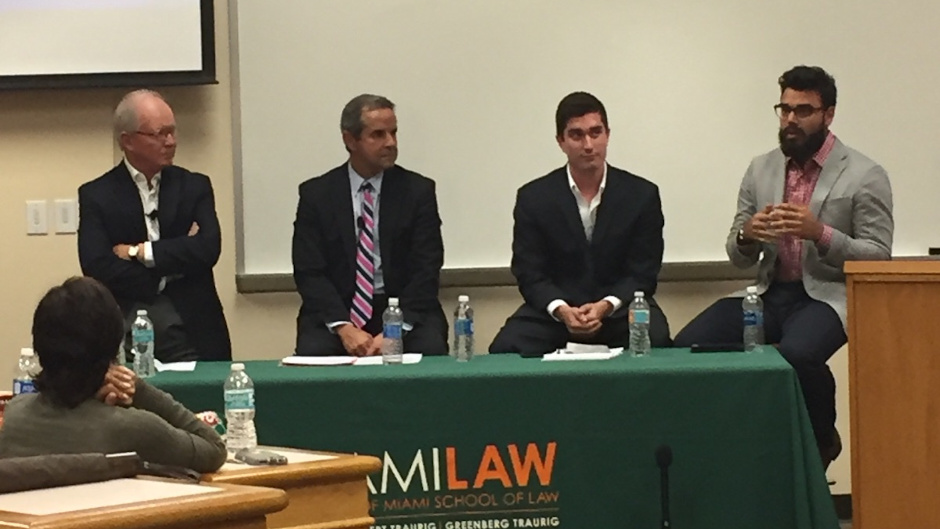Miami Law recently hosted a panel discussion about the future of the City featuring Stephen Owens, former President of Swire Properties in the U.S., and Manny Diaz, JD ’80, former mayor of Miami. The event “Miami 2040” was co-sponsored by the Robert Traurig-Greenberg Traurig LL.M. in Real Property Development and the HOPE Public Interest Resource Center.
Increasing Prices = Displacement
The panel - moderated by Miami Law students Feras Ahmed, a Miami Scholar, and Cullen Mahoney, a Real Property LL.M. candidate - focused the conversation around some of the most pressing issues Miami faces going forward.
One issue included the displacement of local residents resultant of steadily increasing house prices. “We’re seeing developers now targeting areas like Overtown and Little Havana. And as we continue to build, we continue to displace the people of Miami,” Cullen said.
In response, Mayor Diaz recalled events during his tenure as mayor (2001 - 2009) that led to this trend. “Part of the problem were issues involving, for example, security, filth and dirt, neighborhoods that were in decay,”
When you embark on cleaning that up, you inherently raise the value of the properties … it becomes a dilemma in terms of how you deal with the issue. The only way that you deal successfully, or long-term, with affordability, is by dealing with the income side.” Diaz said.
Affordable Housing
As a real estate developer, Stephen Owens noted that most profit-seeking land developers satisfy affordable housing mandates using as little land and resources as possible and that they must be incentivized if they are to develop in a way that is truly beneficial to the people of Miami.
“We live in an entrepreneurial market, a capitalistic system. So somehow there has to be a balance,” Owens said. “And I think you do it through incentives versus mandates.”
Diaz and Owens, coming from public service and private industry backgrounds respectively, came together to lead broad, dynamic discourse on the future of the city. The mayor noted, however, that this was not the first time they worked together to make something great.
“What makes a mayor’s tenure successful, what makes a city successful, is people like Steve Owens,” Diaz said. “I was very lucky to have him during my eight years and to share a relationship and work with him during that time.”
Public Transportation in Miami
Feras shifted the conversation towards the issue of transportation, and Mayor Diaz shared his opinion that Miami’s efforts to address the transit problem have been underwhelming.
“From a transit perspective, there’s a problem. And the problem is that our elected officials, I don't think, have correctly framed the issue,” Diaz said. “It’s an economic imperative for so many reasons in terms of the city’s ability to continue to grow.”
The former mayor believes that the sooner the city addresses the problem, the better. “It is clearly going to be more expensive in the future than if we did it today,” he said. “People always, unfortunately, look at the short term and don’t realize that those kinds of investments are investments that we’re making even not so much for us today as we are for future Miamians.”
Owens gave his opinion on the transit issue from a private-industry perspective, noting, “There is a real awareness that you can have transit-based development, and it can work,” he said. “It affords more people using the system, and, secondly, it’s an enhancement to the system.”
Major Development Project - Brickell City Centre
Swire Properties’ recently completed Brickell City Centre project, a 5.4-million-square-foot hub of shopping, restaurants, offices, and lodging reflects this philosophy. Owens, who oversaw the project, ensured that the Centre was built with transportation in mind. By enhancing walkability, accommodating bicycle traffic, and signing one of the first global partnerships with Uber, whereby riders arriving to or departing from Brickell City Centre get discounted rates, Swire was able to minimize car traffic in the already congested area.
“We built significantly less parking than the city initially was requiring and certainly what the market was telling us it must have. And yet, we’re operational now, and we’re not using the parking we have,” Owens said.
“We pride ourselves, at Miami Law, in looking at issues from unique vantage points and viewing the intersectionality of those issues,” said Marni Lennon, Director of HOPE. “And that’s what this program represents.”
Lennon went on to praise the student moderators.
“I want to commend Cullen and Feras for making [this event] happen. They embody the type of initiative and character and drive to provoke discussion, provoke awareness and to distinguish Miami Law.”
Read More:
Robert Traurig-Greenberg Traurig LL.M. in Real Property Development.
HOPE Public Interest Resource Center

